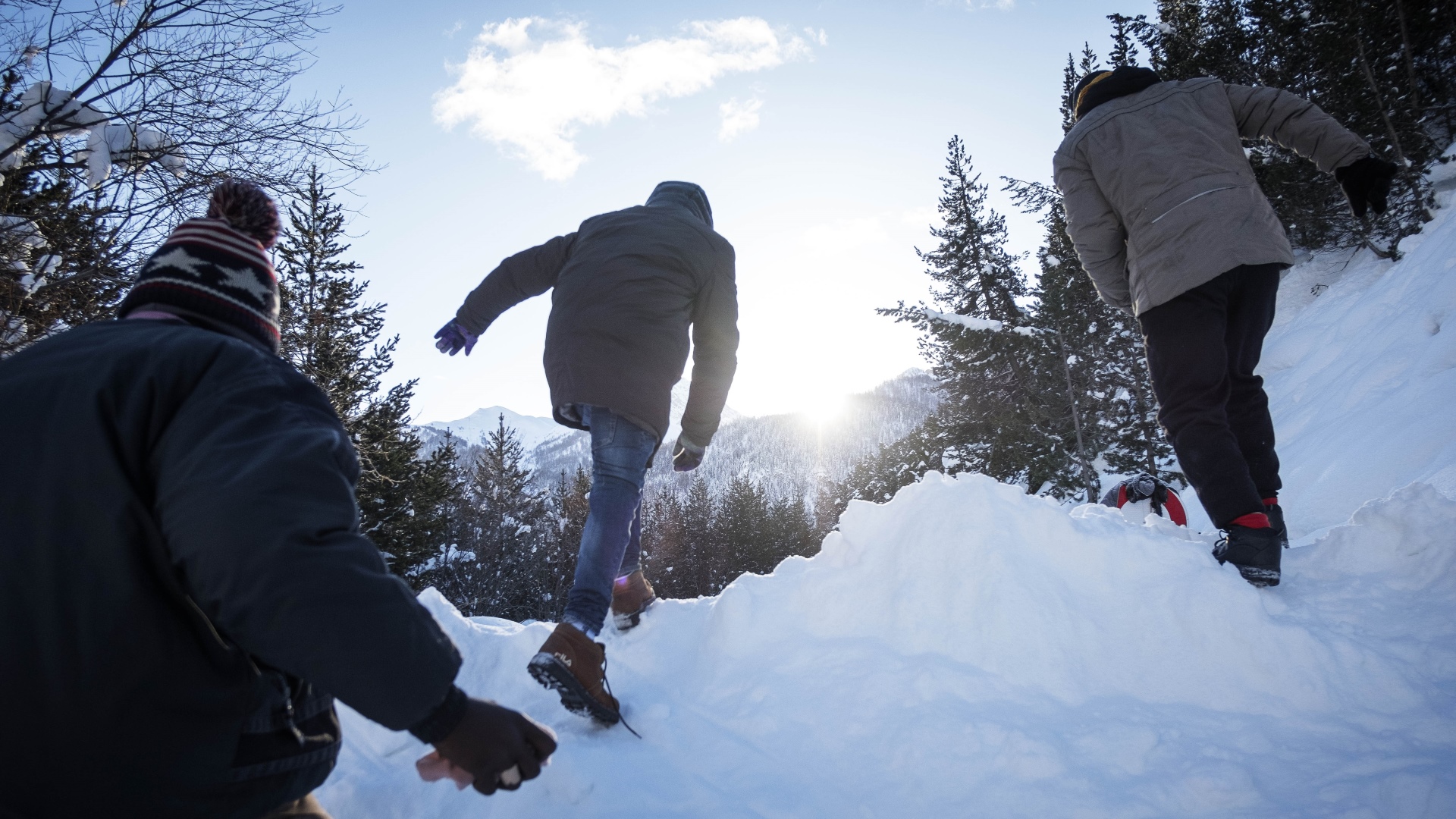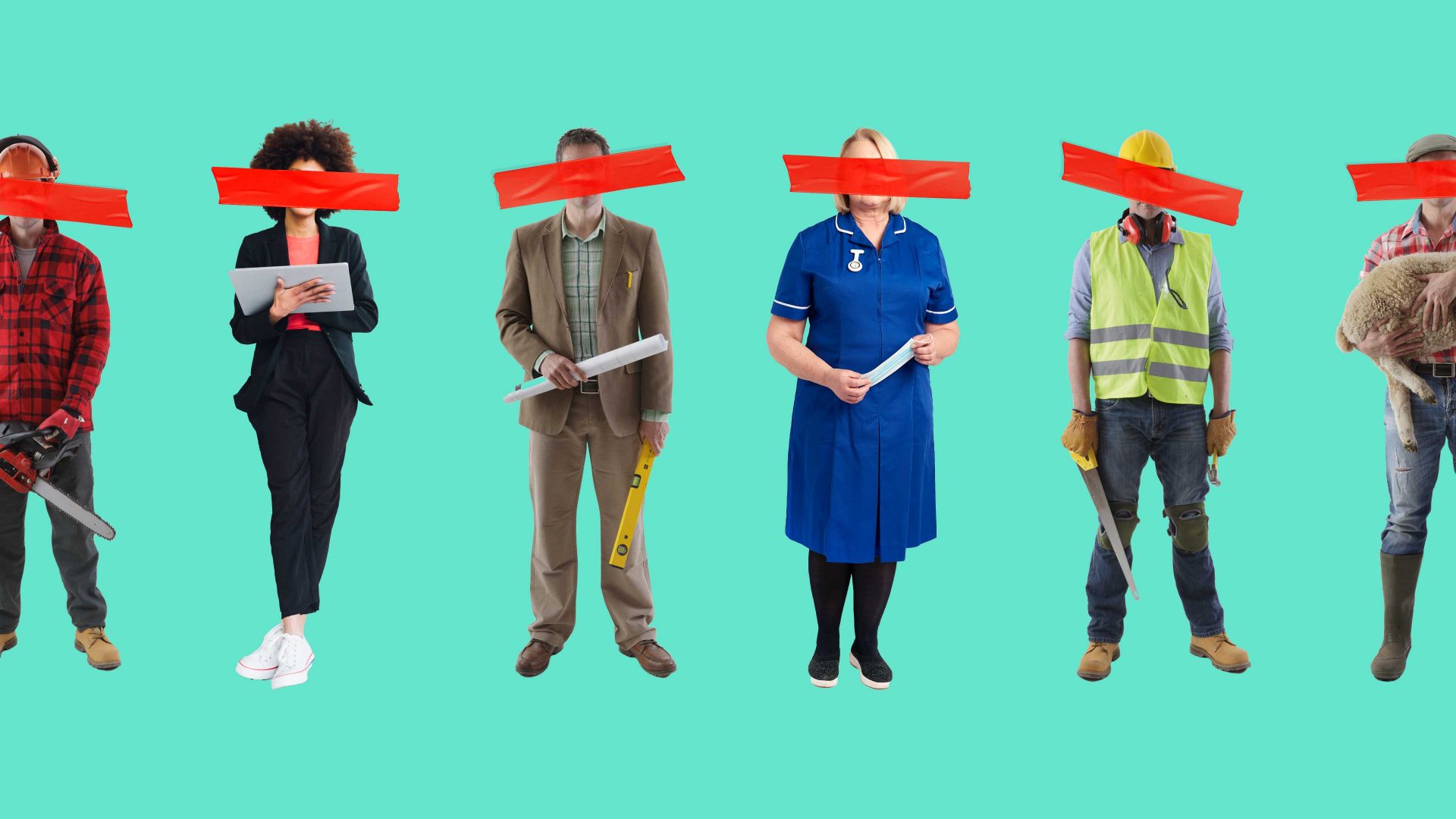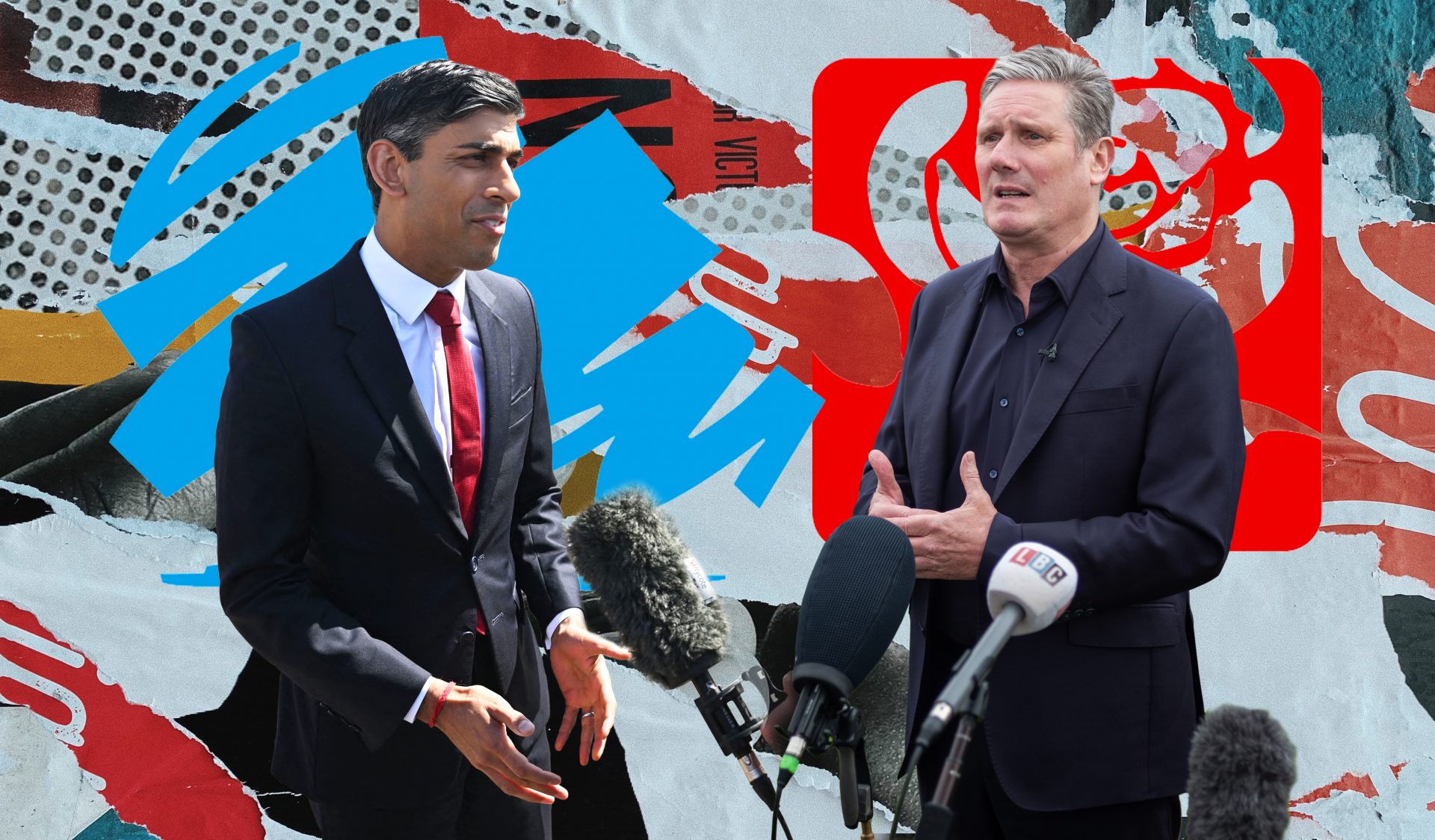It wasn’t simple being a rescuer.
The calls would come in the middle of the night. They would come in the middle of dinner. They would come when he was tired. Simone was never quite ready. He’d been doing this for years, volunteering for the Piedmont rescue crew, but still, it was exhausting. It was hard to race up to the hills. It was hard to find lost hikers, injured cyclists or frightened mushroom pickers that had lost their way.
But still, he’d never done a real rescue. One up in the mountains. One with avalanches, or falls. Somehow the call never came when he was up there. “I live in Turin and those are my calls.”
Still, it was hard to think, the mountains were full of death. But they weren’t streets, they weren’t attractions. The Alps were what they always were. That was why he loved them.
It was that excitement he felt on those bends up from Turin. Mountains rising over him, wrapped in thick woods; blackish, brown and green, like the hair on an enormous animal. That was what made his heart beat faster every time. His eyes on those peaks jagged like children’s drawings.
This had been his whole life. He’d built it all around this. Photography. Writing. Volunteering. Every few days he was here.
“I can’t spend too long away from this air.”
He would park the car in Melezet, at the foot of the ravine. He’d strap his skis on and he’d go up. The snow sparkling like crystal behind him on a bright day. Simone liked to be alone up here. Like every parent, he needed his moments where he felt free. He’d leave the chalets and the pisteurs and once he’d got right up to the top, he’d be right underneath it – le Col de l’Échelle.
“This is one of the most dangerous passes we have.” But one of the places he loved. Its folds, its grey rock face, its glowing white peak. One of those places you really felt it: how many centuries had passed through the Alps. Hannibal’s elephants. Lost Napoleonic soldiers. Smugglers in between the wars. Like a fly in amber, that past was even in its name – il Colle della Scala, or le Col de l’Échelle. In both Italian or French: The Pass of the Ladder.
A tiny hint of old frostbitten lives. Once upon a time not even the shepherds could make it over unless they threw a ladder over the rocks. Even today this road is impassable to cars every winter. Both its two tunnels and those hairpin turns at 1,762m were buried in snow. Iced over. Closed.
“To climb up that mountain? And then to make it through the winter tunnels? Even a rat would struggle. It’s just not possible.”
You still feel it, as you go further up. To that tiny chapel, half grotto, almost a hutch; Notre Dame du Bonne Rencontre, Our Lady of Good Encounter. You can feel it as you enter. Something hard and desperate. Because the fear of the mountain is in here: filled with candles, Madonnas, rosaries and offerings of flowers; the stooped walls lined with plaques of thanks from those who think the Virgin saved them, when they were lost, when they needed her, in the snow.
“This is a mountain that kills.”
It didn’t feel like that though, most days. It felt like other people’s Instagram stories. It felt like a park; not a world where anyone had to cross that peak. It was a world where the rescues he did were mostly to ski lifts. Where most of what he did was pleasure. The click of the camera on a rare bird. The thrill when flakes started to swirl. His notebook in cold hands in the glades. It’s a world Simone never wanted to change.
But that winter something did.
He started to see clothes – fleeces, hoodies, whole puffers, tossed into the snow – hanging from branches, on the side of the path. Human tracks going in circles. Or a pair of shoes, or just one Nike, flipped up there on the path. The one that went up, up there, to Le Col de l’Échelle. Simone didn’t think anything at first.
Then he started to see them. Straggling the kerbs of mountain roads, squinting into cheap smartphones, trying to find the path. Then he’d see them again. He’d be on his skis, halfway up the slope, then they’d walk past, in trainers, in hoodies, in the thinnest kinds of fleece – African men.
“They’re refugees, or something like that,” they told him at the bar. “They’re asylum seekers, so they can’t work in Italy until they’re approved.”
“So they’re trying to go to France.”
The mountain rescuers were talking when it hit him: what was on TV was suddenly here. But what the hell are they doing up here?
“Police at every station and border to catch them. They’re not allowed to travel freely in Europe. So they’re trying to cross the mountains.”
“But Le Col de l’Échelle?” he said. “It’s impassable.”
“You see the phone trick them when they see it on a screen. They hit Walking on Google Maps and this path to France looks flat and easy.”
Some of the rescuers had even heard it was an app. Someone was selling it in the camps: a path to France. “And what about those clothes?”
Simone already knew it but he still asked.
“If you don’t know the mountain, if you don’t know that as soon as you start walking in deep mountains, you get hot, you start sweating. But they don’t know that as soon as you stop in five minutes you’re freezing. It’s hypothermia.”
The mountain rescuers drank in silence. It was one of those restaurants in Melezet that smelled of pine. The kind of place that felt like a refuge.
That night Simone drove back to Turin.
He was twitching to go back. There was going to be work this winter. He kept twitching as the weeks passed, he began to see more and more of them on his days in Melezet. There they were: African men, from their teens to their 50s, some of them in baseball caps, most of them in the cheapest jumpers. None with real scarves. Trudging up the slopes. The snow school, the orange ski tans and the bright Patagonia wear all over the Olympic snowboard piste didn’t notice them. But he did. The rescuers all did. But still no call.
“It was not long after that they found Mamadou.”
“They found him just over in France right at the beginning.”
His legs frozen up to his knees; walking in tears.
This man was from Mali. He was crying, when they found him, because he had tried to cross Le Col de l’Échelle, on the wrong night. They were two friends. They had climbed and clambered until they were wading through snow, but somewhere before the chapel they had slipped into a deep hole. It was snowing, it was night, and they crouched, hugging their knees in the snow, trying, trying everything not to fall asleep, until light, trying to hold on.
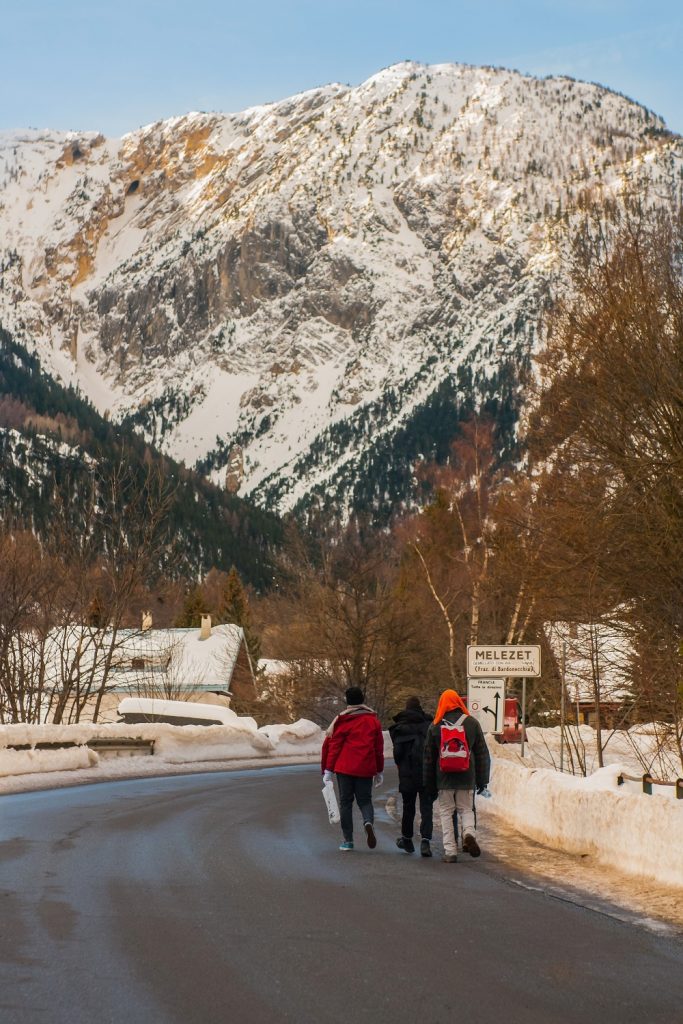
This is what happened. The morning came. They were still alive. Then with the little strength they had, they pulled themselves out. But Mamadou’s friend could not continue. He collapsed. “Mamadou,” he said, giving him his mother’s phone number.
“Call her and tell her I died here. But you go on.”
There was golden light that morning. It was a woman on a dogsled who spotted him, disoriented and in tears. Alone. Like a ghost from the past or maybe the future. Three days later, they amputated his frostbitten feet.
“It was after that,” said Simone.
“The alarm really went out in the valleys.” There were more and more of them now. Whole groups, dozens of them, marching upwards. But still, Simone received no calls.
“I realised they’re too frightened.”
A tension gripped him, like nails digging in. Then a feeling. The feeling of being useless. There was an emergency. There were dozens of them up there – hundreds, even – clambering over the pass. But they weren’t calling. It made his mouth curl just to think about it. It made his stomach turn – watching them, in his car, on his way up and on his way down – knowing that they weren’t calling. That to them he was just like the police.
“Then one day we did finally get a call.” An unknown caller. It was broken Italian.
“My friends, my friends… problem.” It was unmistakable. That was an African man.
“We don’t know who called us.”
“Or how they reached us, but we ran.” Whoever had called them, he wasn’t up there. Then he hung up. The alarm went out. They were shouting, the rescuers.
“Where is he? Get the snowmobiles!”
Two minutes and they were ready: a medical student, a ski-lift operator, a guy from one of the hotels and Simone. Rushing. His heart pounding. It was his first mountain rescue. This wasn’t a lost mushroom picker.
“This time I was up here with the real rescue heroes.”
Quickly they passed the political border.
It looked like a tombstone, the stone post. Swallowed by the snow. On one side: F for France. On their side: I for Italy. The natural border loomed over them. Like a monstrous wall round an enormous castle.
They passed the first signs – Danger d’Avalanches! Then the second – Danger de Mort! After two miles they came to a stop. Cramped on to snowmobiles. Belching exhaust. “We saw the piles of clothes going up.”
Simone’s blood froze. This only meant one thing. The hypothermia had hit. They had been sweating. They’d thrown off their clothes and now halfway further up they’d be freezing. There was only snow, rocks and human tracks ahead. Towards those zigzagging bends. The medical student saw it first. Simone’s heart sank when he saw what shouldn’t be there.
“There was a rough path, a beaten path we had never seen before, that showed us that hundreds of Africans had been trying it. So we followed it.”
You know this if you know the mountains. You know the human paths follow the animals’ paths. The paths are ancient. You might never see them, but they have a logic to them. You must always follow them.
“The Africans had not followed the path.”
“They’d avoided every hairpin bend and climbed the steep ledges to reach the road faster. Because they didn’t have a clue that in the mountains it’s easier and less tiring to go the long way instead of the short way. That’s what saves you.” The ski-lift operator hit the ignition. They ploughed on.
The snowmobiles gurgled and groaned. Snow sprayed as they bounced off rocks and drifts. That day the light was strange. It was noon when the rescuers went up, but this was the north face of the mountain; so in this kind of winter the sunlight was gone from there. Simone and the rescuers stopped, switched off the roaring engine, and listened.
But there was only silence. The silence you only get in the mountains; without currents and without birds. Like the background noise was gone. He could hear himself breathing.
“We were in deep shade. This is a strange light, the one you get in the deep mountain shade, because you see the sun all around but where you are it’s all in the deep shade. It’s strange because it makes everything look a bit blue. The light, the snow… it all seems blue. Almost like you are underwater.”
Nothing. They kept going.
“Higher,” it was the medical student.
“Quickly. Let’s go.”
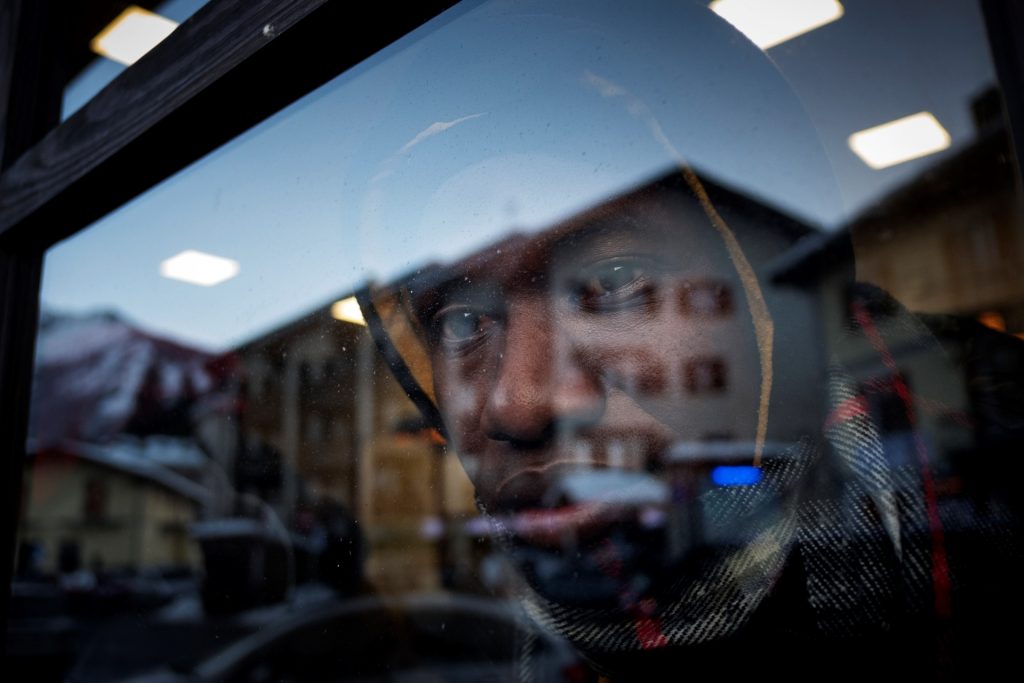
The path rose above the slopes; above the forests; until the piste was far and tiny beneath them. The snowmobiles drove 4km, but there was nobody; only clothes on the path up the wooded slopes. Then they jumped off the snowmobile, Simone and the three rescuers, and put on skis.
“Can you hear that?” Nothing. It was all in their head.
“Can you see that?” Nothing still. The sun began to dip as they trekked.
They kept going for 2km on foot.
“Then we saw them.” At the mouth of the tunnel of Le Col de l’Échelle. “They were shivering in a really cold and shady place. And one of them I could see he seemed really in a bad way.” They waved. They waved back.
Simone yelled: “We’re not police.”
“Come down, please. Come down.”
The men huddled together. “They seemed tired and scared.”
Simone could see their faces now. And that was when he really saw it.
“You can always see fear in the eyes. You can see it by how a man looks around. How your eyes look around changes when you are scared. You start to receive danger from everything you see. That is fear.”
There were eight of them, in their 20s. And they said they were all from Guinea. Pitiful, in sodden trainers and snow-wet jeans.
“By the way they were walking I could tell they had frostbite.”
“They seemed like they might be falling down at every step. They weren’t putting their feet properly on the snow.” That day it was -6C. The light was half gone.
“France,” they said. “We want France.”
The rescuers shouted back. “We can’t take you to France.”
It was after they said they could only take them down, something rippled through the group. No. They would not go back.
“They talked, in their language, what to do, whether to continue. Two were very, very determined to carry on. Very, very determined. We tried to tell them we were not police. We were there to help them. But the two who were determined yelled – ‘No, no, leave us’.”
“We will carry on.”
They became frantic, the rescuers. They tried gestures, they tried French, they talked louder – they tried everything to stop them.
“We told them it was dangerous. That it was soon going to be dark. That there were avalanches. We told them we ourselves would not go here at this time of day. But they didn’t listen to us.”
They got up. The wind was whining. The rescuers were yelling – “Stop, stop, we are telling you now the French police are waiting for you on the other side – and they will take you back to Italy. You have hypothermia. You could die.”
“Do you understand? You can die.”
They stared back impassively.
“It’s impossible even for us in our gear. You can’t make it. Not even a fox can make it. Please.”
Those tunnels are packed with snow.
But it was pointless. The sun had begun to fall. One of the men waved a certificate he said he had received when he arrived in Sicily exactly 15 days earlier.
“He had a calm face, this man. He didn’t seem to know this banned him from entering France. Or maybe, on some level, he did. Because his eyes, they looked… defeated.”
The rescuers held back.
“Now they were debating very calmly among themselves. But the two more determined ones said – ‘We are going to try and make it to France’. Whether you follow us or not.’”
They got up first and then the rest, for a moment they hesitated, and then they followed. Leaving the rescuers behind. Simone radioed back.
“They are continuing.”
It was cold, like all shocks, that rushed through his body. “We watched them stagger on all the way until they reached the tunnel. It was one of those moments you don’t know what to say. So we didn’t say anything. We just watched.” He could hardly blink. They’d never seen anything like this. They couldn’t compute something like this. Never – not one of them could remember – had an SOS been called on the mountain, to be turned away. They went down in silence. The horror silent and growing.
That scene in their minds. Those shapes turning away.
They couldn’t look back. It felt wrong. Down in the resort, which always feels like any other, like an extraterritorial republic of serviced chalets and ski instructors, they said goodbye. They shook hands. “See you around, thanks.” The medical student, the ski-lift operator and the guy from one of the hotels drifted off. Simone had to get home.
It was then that he realised he was shaking slightly. His hands trembled as he turned the keys to his car. It was something he hardly thought of, the border. Invisible to him. The world to them. It was almost like there were two categories of human beings, he thought. Those who could and those who couldn’t.
The road snaked. The mountains began to disappear. The first turnoff was coming. He felt almost sick. “I felt like something was broken.” They were still up there.
“We don’t know how many of them have died. We don’t know what has happened. There is no way of knowing how many got lost. We have no way of knowing how many were caught up there but were too frightened of the police or of being deported to call us for help. We have no way of knowing how many turned back and how many struggled on alone.”
All winter they had found the clothes.
“Only in spring will we count their bodies.”
An extract from This Is Europe: How We Live Now, by Ben Judah, published by Picador

